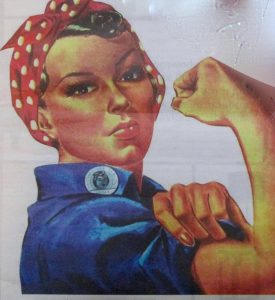International Women’s Day, celebrated on March 8th every year, has been around for more than a century now; but I only learned about it when I lived in Africa for more than five years, twenty years ago. In the States, perhaps, people – at least the type of people I knew growing up in comfy, white, suburban New Jersey – didn’t need such reminders of inequality. We had arrived. Or so most thought.
According to the website www.internationalwomensday.com, the purpose of International Women’s Day is to celebrate “the social, economic, cultural and political achievement of women. Yet progress has slowed in many places across the world, so global action is needed to accelerate gender parity.”
This Wednesday, March 8, here in San Miguel de Allende, Mexico, International Women’s Day will be celebrated in el centro by, among other events, a peaceful march led by a specially created Mojiganga (larger-than-life dancing puppet), accompanied by an all-women mariachi band, followed by a candle lighting ceremony in remembrance of domestic violence and sexual assault victims. (To learn more, go to www.sermujersma.com.)

Perhaps, too, in the wake of the Women’s March on Washington, and all of its sister marches around the U.S. and the world this past January, more American women will find a way to raise awareness of women’s issues this Wednesday.
When the new U.S. president welcomes “all governors and their wives” to a White House event (What did Susana Martinez, governor of New Mexico and chairwoman of the Republican Governors Association, think about that, I wonder?) — and he seems intent on turning the clocks back to the repressive 1950s – more American women than ever are waking to the reality that gender parity in the “land of the free” is far from reached.
In Africa, International Women’s Day, I remember well, was cause for jubilation. The women made special outfits – puffy-sleeved, flouncy, colorful cotton dresses and matching headscarves – and gathered together to dance and sing (and, of course, eat). In Segou, Mali, where I lived for three years, I volunteered at a women’s center near my home and brought with me to one such International Women’s Day celebration a gaggle of girls from my weekly “Club Crochet” group (little girls who lived in my neighborhood and whom I taught how to crochet using “yarn” made from plastic bags).
Here is a memory of that occasion, excerpted from my memoir How to Make an African Quilt (Nighthawk Press, 2013):
On March 8th, International Women’s Day, “La Journée Internationale de la Femme,” which is widely celebrated in Mali, thirty of my Club Crochet girls arrived at my house early in the afternoon. We’d made a date to walk together as a “women’s group” to Centre Benkady, where an International Women’s Day manifestation (event) was to be held.
It would be a women’s-only gathering with dancing and singing, so the little girls, aged eight to twelve, had dressed for the occasion in their best lacey, satiny dresses. Instead of their usual flip-flops, some wore plastic sandals with low heels. Their mothers or older sisters had done their hair in braids, bows, and barrettes. Some of the girls even wore lipstick.
We walked the mile to Benkady holding hands and singing a marching song I’d just made up: “Nous sommes les femmes et nous sommes FORTES!” (We are women and we are STRONG), stopping to stamp our collective feet when we got to the word “FORTE!” Aminata’s best friend Bintou translated the words for her. Aminata [my nine-year-old next-door neighbor and buddy] shot me a conspiratorial smile. She knew what I was up to.
What a sight we must have been to the people we passed: thirty lively little African girls in party dresses, led by a tall, thin, middle-aged white woman, all laughing, giggling, singing, holding hands, swinging arms, marching and stomping our way down the dusty roads of quartier Pelangana.
Most of the people we passed, I knew, wouldn’t know the words of our marching song because they probably didn’t speak French. So they smiled and waved at us benignly as we paraded by, as though we were just having fun, playing a game. The girls seemed to know, though, as we marched forth, that this was much more than a game. I was leading a mini-revolution that, I hoped, might grow as these girls grew into strong women.
~ ~ ~
I can only hope and pray today that at least some of those girls, now grown women, will be celebrating their strengths and achievements this Wednesday, March 8th – and will remember the simple words to our marching song.
